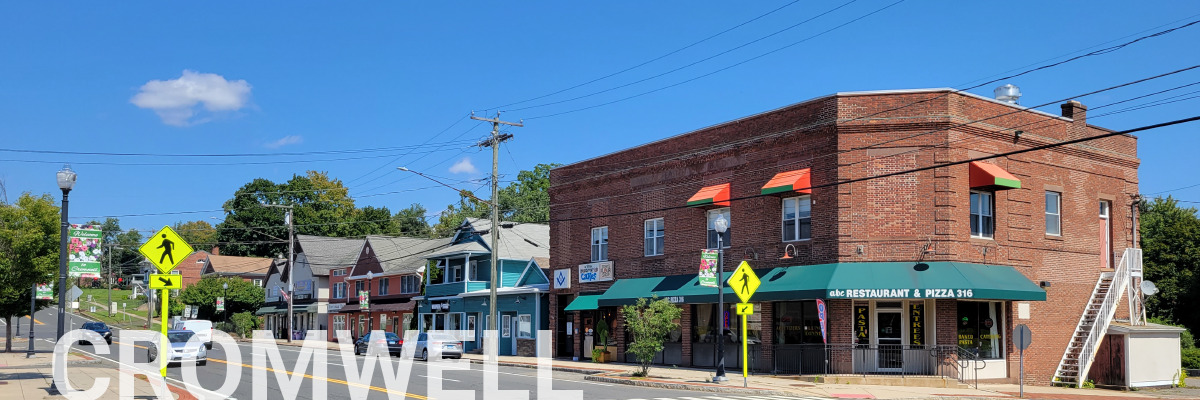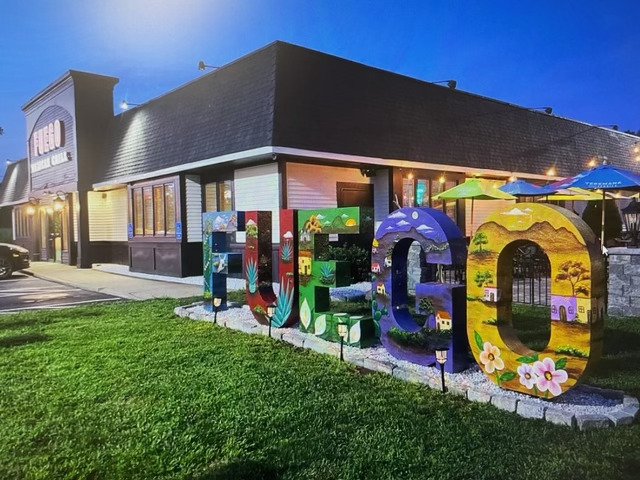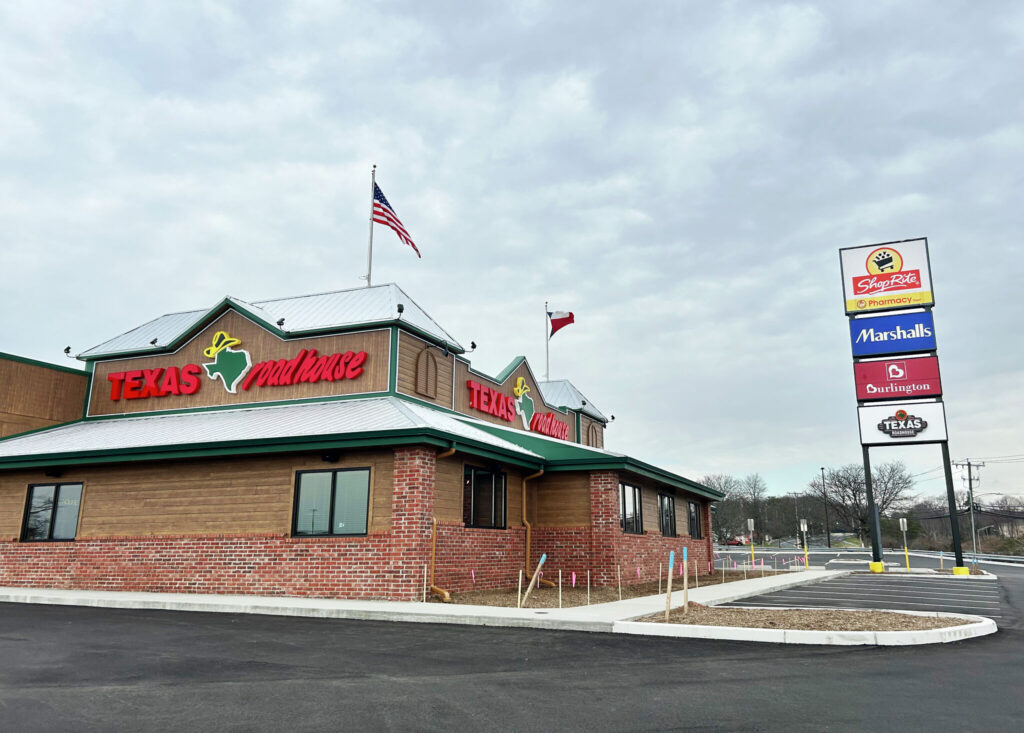Economic Development Newsletter
September 2024 - Cromwell

CROMWELL, CONNECTICUT
Incorporated in 1851, Cromwell, the northernmost town in Middlesex County is 13.5 square miles centrally located with quick access to major highways like Route 9, I-91, and I-84.
Residents and businesses enjoy the suburban community's conveniences with diverse retail and restaurant selections, the high quality of life and good school system, and access to nature at the River Highlands State Park for hiking, walking, camping, and bird watching overlooking the Connecticut River.
Cromwell is also home to TPC River Highlands - the location of the Travelers Championship, a PGA Tour Signature event.
TOWN STATS
General
Current Population: 14,250
Median Age: 43
Economy
Top Industries
1. Health Care & Social Assistance
2. Retail
3. Accommodation & Food Service
4. Manufacturing
5. Administrative & Support
Housing
Median Home Value: $288,600
Median Rent: $1,391
Housing Units: 6,301
From 2024 Town Profiles courtesy of AdvanceCT and CT Data Collaborative.

Stuart Popper, AICP
Stuart Popper, AICP, has been the Director of Planning and Development in Cromwell since 2012, focusing on community and land use planning, economic development, permitting and regulatory compliance, and transportation and land use connections.
With over 25 years of planning experience on the municipal and regional levels and in the private sector, Stuart's planning projects have included corridor and streetscape improvement studies, plans of conservation and development, regulation amendments, and subdivision and site plan reviews. He has worked with boards and commissions, chambers of commerce, developers, neighborhood groups, and residents.
Stuart has always stressed improving bicycle, pedestrian, and transit access in all his work. His public outreach work has included identifying and working with stakeholders, conducting neighborhood workshops and surveys, and moderating public meetings.
Three Questions for Craig Way
We sat down with Craig Way, Managing Director of HB Nitkin, property developer and owner of Cromwell Square, to ask him about working with the Town of Cromwell, what their recipe for success has been, and to look into the future of trends in retail developments.
Q: Why Cromwell?
A: Cromwell is one of the best towns in the county, in the second most high-income county in the state… but, really, with Cromwell’s central location, major highway access, and proximity to both Hartford and the Connecticut shoreline, it’s really ideal. From a “doing business” standpoint, Cromwell is as business-friendly as they come, and the proof is in the pudding, as they say, with the smart development being planned and built within town. It's not just all one type of development - it's a mixture of a lot of different uses that are sensible wherever they're being built - whether it's a hotel like a Spring Hill Suites, or whether it's a retail property, whether it's housing or multi-family housing, or an industrial property, from our standpoint, Cromwell seems to “get it” as far as what will make a town more economically viable.
Q: You have developments in many towns across the State, so you’ve seen the good, the bad, and the ugly when it comes to the municipal economic development, planning and zoning, and permitting processes. How has your experience been with Cromwell?
A: Cromwell is unique – from our perspective, working with the Town seems cohesive, in terms that all the departments communicate with each other. Not every town is like that. When a new tenant comes in, the planning and zoning office, the building department, the town manager, the chief of police, the health department, they're all together in sync. They are very welcoming and offer to organize a meeting for all of the different departments to greet the business owner, be available to answer questions and help them in any way to make the process smoother. Don’t get me wrong, they do things by the book – not going to rubber stamp everything – but they are engaged and make sure that all departments communicate with each other. And towns aren't like that in general. I mean, Cromwell should teach a course for other towns!
Q: Looking into your crystal ball, what trends do you see for tenant types in developments like Cromwell Square? What’s the future for shopping malls?
We love our property – Cromwell Square - we've owned it for about 35 years, and there have been a lot of changes with the property, but it's always been as well-located a property as could be in Cromwell. As an owner, you want to create the best possible experience for the customers through the best possible tenants. But that hasn’t always been the case given we inherited K-Mart; however, we’ve been fortunate that we have been able to redevelop it as consumer behaviors have changed, and with the additions of Shop Rite, Marshalls, Burlington, Five Below, Texas Roadhouse, and Goldfish Swim School, we feel we have a good mix of complementary retail, restaurant, and service tenants for what the community wants and needs.
As for trends, unfortunately, we’ll continue to see the demise of the interior mall – with the exception of the great ones like West Farms, who drive traffic through ‘best in class’ anchor and specialty stores that are in touch with consumer shopping trends. Outdoor lifestyle centers are still popular – like Evergreen Walk or Blue Back Square. The key to success for retailers is being able to compete with the internet by providing experiences. Those who provide an experience or entertainment while you shop or dine are the types of tenants who will win and will be sought out. Recent unique concepts include escape rooms and golf simulators coupled with a restaurant and bar component. More typical successful concepts that compete well with the internet include top discount stores, quality quick service and casual restaurant concepts, health and beauty services stores, fitness studios and technology cell phone sales and service stores. And, of course, accessible medical services like urgent care, lab facilities, dialysis, physical therapists, and massage therapy facilities will continue to seek traditional retail locations for new locations and expansion options.

What does Economic Development do for a community?
Courtesy of iedconline.org
A vibrant economy is the result of deliberate choices and actions. All communities need a person or an organization charged with improving the health of the local economy. That’s what economic developers and economic development organizations do.
Economic development consists of programs, policies, and activities that seek to improve the economic well-being and quality of life of a community by creating and retaining jobs and providing a stable tax base. Ultimately, economic development is a revenue strategy for a community, generating additional tax dollars from new business investment.
Economic developers aim to:
- Bring new businesses in and promote the community as a location for economic activity
- Help existing local businesses solve problems that would cause them to fail, close, or move away
- Help local businesses grow and expand
- Help entrepreneurs and new firms start up and access the resources they need to succeed
- Improve a community’s quality of life

Cromwell Creative District
Creative Districts were developed in 2010 by the National Endowment for the Arts (NEA) to renew blighted urban areas and forgotten Main Streets. In 2019, the Cromwell Creative District was initiated and became a 501(c)3 nonprofit with a mission focusing on businesses and economic vitality.
For over five years, CCD has held events like the Scarecrow Contest and Holiday Decorating Contest #inthedistrict, bringing residents and visitors downtown. Some events have grown so large that they now have to be held elsewhere, and this coming year, the Coffeehouse will be held at the Courtyard Marriott on February 22, 2025. This past September, CCD held its First Annual Town-Wide Tag Sales to benefit all Cromwell residents. CCD has added several murals in Town Parks and for individual businesses, and CCD gives back to the town by sponsoring the Farmers Market and Trick R Trunk for the PTO. CCD is currently working to renovate the vacant town sewer garage adjacent to Pierson Park for use by all nonprofits and, when available, by the Senior Center, Rec and Youth Departments, and the Police for training purposes. In 2024, CCD offered mini-grants totaling $5,000 to local small businesses in the district. Visit the Cromwell Creative District's website to learn more and explore how to become a member or friend.




